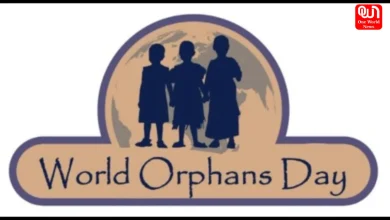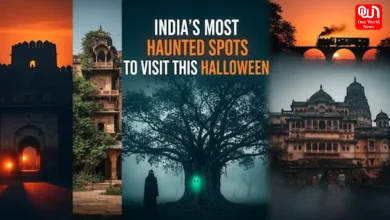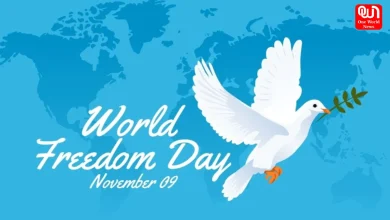‘Bharat Rising of Viswaguru’: Exclusive Interview with Dr. Vivek Singh
In an exclusive interview, Dr. Vivek Singh talks about "Bharat Rising of Viswaguru" and examines geopolitics, cultural legacy, and Prime Minister Modi's contribution to India's position around the world.
Dr. Vivek Singh Explains the Concept of ‘Akhand Bharat’ and ‘Viswaguru’ in a Global Context
On Wednesday evening, the OWN team got a chance to meet the person behind the book ‘Bharat Rising of Viswaguru’. Dr.Vivek Singh is a Solicitor and an Advocate in the Supreme Court of India (or Bharat).On the evening of August 28, 2023, Dr Vivek Singh launched his book “Bharat Rising of Viswaguru” at the Headquarters of United Nations in New York City, celebrating the confluence of literature, culture, and diplomacy.
In the exclusive interview with OWN, Dr.Vivek talked about a lot of topics including his book ,geopolitics, India vs Bharat etc.
- What is the subject matter of this book, and who served as its inspiration?
This book primarily delves into the work of Prime Minister Modi. It explores his accomplishments, speeches, and commitments to the people of India. The reason behind naming this book ‘Bharat Rising of Viswaguru’ is our rich cultural heritage. Our culture, which we have heard about from our elders and read about in scriptures, signifies its vastness and greatness. It serves as proof of why Bharat was once considered a Vishwaguru, meaning the entire world used to learn from us in the realms of economics, politics, and society. However, due to invasions and British colonialism, this image of Vishwaguru faded away.
An incident worth noting is when, after the 1971 war, former Prime Minister Smt. Indira Gandhi went to meet President Nixon. She was made to wait for 45 minutes and this reflected disrespect not only towards Smt. Indira Gandhi but to the entire country.
During Modi’s tenure, significant changes have been taking place. The fact that the U.S. President himself waits at the door to receive Modi Ji speaks volumes. This book draws inspiration from the hope that under Modi Ji’s leadership our country will once again regain its status as Vishwaguru.
- What are your thoughts about the terms ‘AKHAND BHARAT and VISHWAGURU ‘?
Western countries, primarily the United States have held significant global influence and have been considered superpowers for an extended period. However, there exists a substantial distinction between being a superpower and being a ‘Vishwaguru.’ While a country becomes a superpower due to factors such as its military strength, technological advancements, economic prowess, and overall power, these attributes alone do not qualify it as a Vishwaguru. When people align themselves with a superpower, it often stems from fear, and their respect is based on the power that the country wields.
In contrast, being a Vishwaguru entails a different dimension—it involves imparting knowledge and wisdom to the entire world, enlightening people with profound insights. Historically, Bharat (India) has always contributed culturally and politically to the global stage, sharing its wisdom with the world. Today, Bharat is once again on the path to facilitate global learning and enlightenment. An example of this is Chandrayaan-3, which showcases Bharat’s commitment to advancing knowledge and exploration.
Criticism often arises when one’s power is perceived as a threat, which is why some may criticize Bharat. However, the goal of becoming a Vishwaguru is to inspire and educate the world, ultimately fostering a more enlightened global community.
- Can you tell us about the significance of launching “Bharat Rising of Vishwaguru” at the United Nations Headquarters in New York City?
The title of my book is “Bharat Rising of Vishwaguru,” signifying its global significance. The ancient shloka of Vasudhaiva Kutumbakam, which translates to “the whole world is a family,” has an enduring relevance here. In the contemporary world, the United Nations headquarters serves as a symbolic center of global cooperation and unity. The decision to launch this book at the United Nations headquarters underscores the idea that Bharat (India) is a nation open to all, and everyone is welcome here. It emphasizes the importance of fostering a sense of unity and global kinship, echoing the timeless wisdom of Vasudhaiva Kutumbakam.
- How do you view the criticism of Prime Minister Modi on an international level, such as the case of the “Ask Modi” campaign during his visit to the USA?
It is a common phenomenon that both powerful nations and countries with global influence often find it challenging to accommodate the rise and competition from developing countries or others seeking to challenge their positions. Consequently, they may subject such countries to criticism, sometimes even for minor issues. There are individuals and groups, like George Soros and others, who wield significant influence on the international stage and may pursue various strategies or theories to shape the development trajectories of countries like India during Prime Minister Modi’s tenure. These dynamics are part of the complex and competitive nature of global politics and international relations.
This was just an excerpt of the enlightening conversation with Dr. Singh. To learn more about geopolitical and cultural changes in India by Dr. Vivek Singh, kindly watch the entire video here-
Liked this post?
Register at One World News to never miss out on videos, celeb interviews, and best reads.








